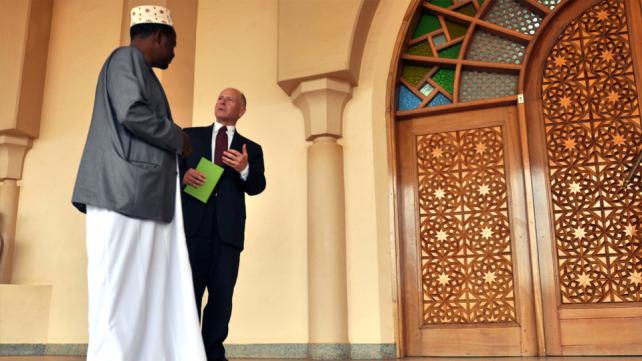
Sure, Islam isn't racist; almost any Muslim will tell you.
But Islam's very strong stance against racism and prejudice wasn't just demonstrated in words and principles (Quran 49:13). It was also evident in the Prophet's establishment of the Moakha system.
About six months after the Muslims of Makkah had left their homes, livelihoods and in many cases, their families, for the sake of Allah and migrated to Madinah, the Prophet established a system that would bring together Muslims of two different cities and different tribes, races and ethnic backgrounds.
The Muslims who had left Makkah were called Muhajirs, migrants who had left their homes for the sake of Allah. They were now homeless and more or less penniless in Madinah. They needed help.
Enter the Muslims of Madinah. They became the Ansars (helpers) of their Muhajir brothers and sisters in faith.
They were not just "roommates"
Moakha with the same root as akh in Arabic means a system of making people brothers. The Prophet paired one Muhajir with one Ansar. They were not just temporary roommates. They became brothers, in the truest sense. Not only did the Ansari Muslim provide the Muhajir Muslim with food, shelter, and clothing. He offered him consolation, support and true Muslim fellowship.
Although there were no set rules, every one of the Ansar who got a Muhajir as his brother gave an equal share in his property and belongings to his Muhajir brother.
In the bad old days of Arab tribal enmity and prejudices, the Moakha system was truly revolutionary. It gave the Muhajirs a chance to rebuild their lives in their new home, while creating a deep bond of love and affection between Muslims of two very different cities.
The regional differences between people, languages and culture, despite smaller distances as compared to today, were great.
So it was perhaps strange for people at the time to think of an Arab and a non-Arab living together as brothers. Just as it is even today in some places strange to see whites and blacks living together peacefully, but not as mere roommates-rather, as brothers.
For instance, Bilal ibn Rabah, an African Muhajir and an ex-slave, was paired, as a brother, with Abu Rawahah Abdullah ibn Abdul Rahman. And they were brothers, not mere "roommates". A black man and an Arab. Who could have imagined this state of affairs in the pre-Islamic tribal Arabia?
They used to even inherit from each other
This brotherhood was even more important than the blood relationship, since it was based on faith, not genetics or blood.
This existed to such a degree that initially, the Muslim brothers in Moakha would inherit from each other. However, later on, this practice was abrogated.
The Moakha system is clearly an example of Islam's solid commitment to the establishment of a brotherhood based not on color, language, race or ethnicity, but purely on faith. Muslims today need to remember this system and our community leadership should be proactive to implement the Islamic ideals.
Photo Attribution: US Army Africa - http://www.flickr.com/photos/usarmyafrica/5859012721/



Comments
Moakha System
Masha-Allah for a well-written and succinct article highlighting the key aspects of the Moakha (Brotherhood) System implemented by the Prophet (Peace and Blessings be upon him). The Muhajireen were essentially refugees, homeless and penniless. The Spirit of Brotherhood displayed by the Ansar in Medina not only ended the 100 year war between the Aws and Khasraj (of Medina) but also included the new migrants into the Concept of Ummah. Today's Muslims and Muslim Nations can take many lessons from that Beautiful example by helping the millions of Muslim Refugees in many parts of the World, whose lives have been destroyed by warfare and civil conflict. The Ansar were so generous that they offered 50% of their Business (trade) and also offered 50% of their wives, informing the Muhajireen to choose the most beautiful ones for themselves. The refugees were treated with honour and their dignity was respected because they were first and foremost, reciters and believers in the Kalimah: There is no god worthy of worship except Allah (SWT), the One and Only True God of all that exists. May we as today's Ummah, though we are fractured and distant in many nations, may we always strive towards Global Unity. Islam is the First to introduce the Concept of a "Global Village" with no borders; unfortunately with the dismantling of the Ottoman Empire, many new artificial borders and "kings" were placed in positions of power, to thereby weaken the spirit of the Ummah. Always remember the Global Ummah in your Dua's since if one part of the body is in pain, then the whole body feels the pain. Thank you for a wonderful article and may Allah (SWT) Reward you. Ameen! Yaa Rabb-al-Aa'la'meen! Dr Ahmed Adam [South Africa]
Location
ASSALAMU ALAIKUM WA RAHMATULLAHI WA BARAKATUH I have enjoyed reading all messsage that are posted on Sounvision the staff is doing a wonderful job spreaing Islam and helping those that read these message understand Islam better, reading these messagea has help me. May ALLAH(swt) bless the sound vision staff. WA ALAIKUM ASSALAMU
Location
Subhaan-AlLaah! Exactly the reminder we need in today's troubled world (with the lack of tolerance it displays)!!!It is not the colour of our skin or the languages we speak that count, but the colour of our heart and the message it sends out.JazakalLaah Soundvision!
Location
as wr wb.may allah reward the soundvision team and other members for bringing such vital information and services into our homes.
Location
wow masallah good article
Location
The Moakha System..I like. The last of my living Grandparents told me a story about our Family's history in America just 13days ago. The Moakha System was definitly used in our family. I will share this with my children.
Location
Add new comment